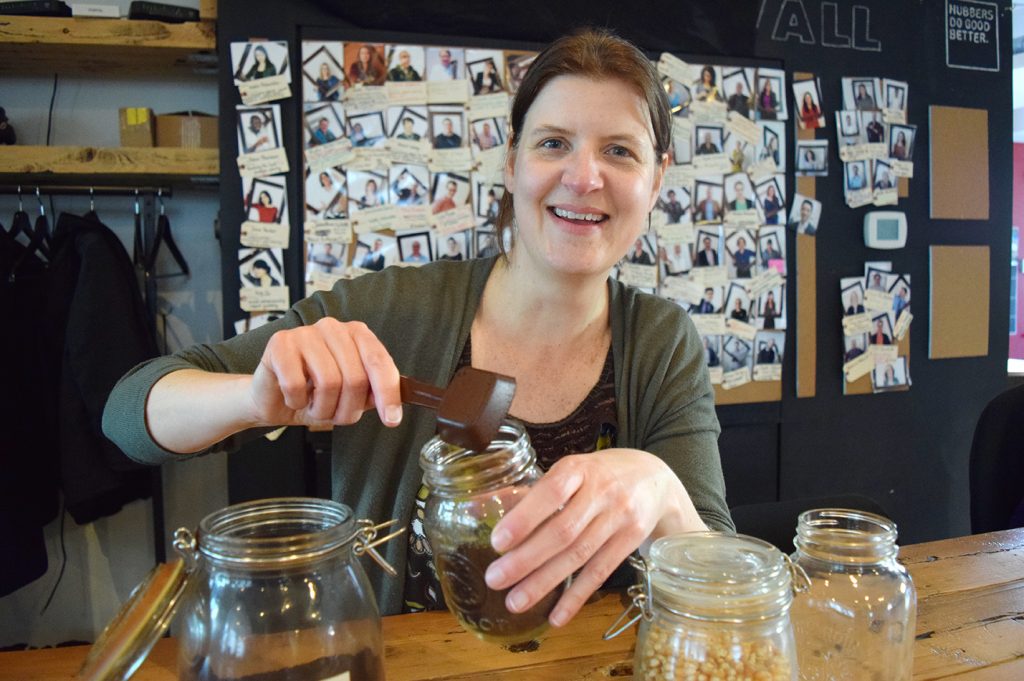Teacher set to launch green grocery store
By Catherine Kelly
Try to imagine a grocery store without rows of canned goods, brightly coloured cereal aisles or plastic bags for your produce. Lisgar Collegiate Institute French teacher Valérie Leloup can —and she’ll be opening one in central Ottawa this summer.
With zero-waste grocery stores popping up all across Europe recently, the concept for Nu Grocery store may be recycled, but it will certainly be the first of its kind in this city.
The grocery store would provide Ottawa residents with a convenient way to find locally sourced goods that are all either packaging-free or compostable.
For Leloup, making the waste-free lifestyle more convenient is key to growing the movement.
“The hope is that the store will make a zero-waste lifestyle more accessible and convenient,” she said. “And if it’s more convenient, then people are more likely to change their habits.”
The idea for the store came to Leloup after she read California author Bea Johnson’s Zero Waste Home. The book sparked the zero-waste lifestyle, one that promotes buying locally and in bulk so that shoppers can use their own reusable bags and tupperware containers instead of single-use containers.
Although enthusiastic, Leloup found it hard at first to fully commit to the waste-free lifestyle. To check off even the most basic items from her grocery list, she commutes from her Kanata home to several bulk stores across town.
“I’ll have to drive downtown to get olive oil and vinegar, because I have no store close to my home where I can buy them in stock. But I would say that’s less of a problem than cheese, because I don’t consume it as heavily.”
She laughed about the cheese. “I need lots – I grew up in France.”
Leloup estimates she’ll have around 350 package-free products available at her store. Of course there’ll be cheese, but local produce, baked goods, pre-prepared meals, condiments, nut-butters, sauces, pasta, grains, and non-food items, too, like shampoos and cleaning products.
For Leloup, finding local producers is a key part of the project.
“It’s very important to me to work with local suppliers,” Leloup said, “not just because it’s good for the local economy and for green house solutions, but also because it enables us to be zero-waste on the supply side.”
Although she said some products like coconut oil, for example, are impossible to get locally, Leloup strives to have around 70 per cent of her providers located either locally or regionally. This way, she said, it’s easier to change the supplier’s waste habits.
“I think if we want our customers to reduce waste, then we should strive to reduce waste in our operations, too,” she said. “And with a local supplier, what you can do is take back to empty containers form the previous orders and clean and re-use them, which then gives us a circular economy here that you can’t do if you use a supplier from Vancouver.”
Surprisingly, finding providers was once Leloup’s bread and butter. Before teaching French, Leloup was once in charge of Danone’s goods and service procurement for all of North America. She even began her 10-year career at the yogurt company by procuring packaging providers.
“It’s ironic,” she said. “I started by buying packaging — and now I’m getting rid of it.”
The entrepreneur said that she left the company at the height of her career to teach because she missed a higher cause than maximizing profits and shareholder values.
“When I went into teaching, it was so much more rewarding and I feel like this project is really at the crossroads of everything I am,” she said. “So the former business manager, but also the teacher, because there is a pedagogical component by building awareness about waste prevention, and of course, the social activist in me that goes to climate marches and believes so passionately about this.”
Leloup said that by opening in a central location, the store will make the lifestyle more accessible, which is the ultimate goal.
“What our store is doing, is making sure that all the products you need are available in one place,” says Leloup.
“I hope it’s going to be a smash hit — and not just because I have a vested interest in it, but because it could really make a difference if it takes off.”
Leloup won’t disclose where she’ll be opening the store until she officially signs the lease, but she said that Centretown is amongst her favourite communities — not only for its central location, but also because many of its residents are millennials, her ideal customers.
“Location depends on who you target, and when I ask myself who were going to be my customers, I knew that this would appeal to a wide range of people — but millennials especially,” she said.
“This generation is more concerned about sustainability than the generation before them,” Leloup said. “And they’re more flexible and more willing to change their habits, too.”
Though partnerships with local farms and suppliers are still in the works, Leloup has already started to organize events to grow the zero-waste community. On April 18, she will be hosting zero-waste guru Bea Johnson at First Baptist Church on Laurier Avenue. Tickets are available online for $7 and any profits will be donated to the Ottawa Food Bank.

